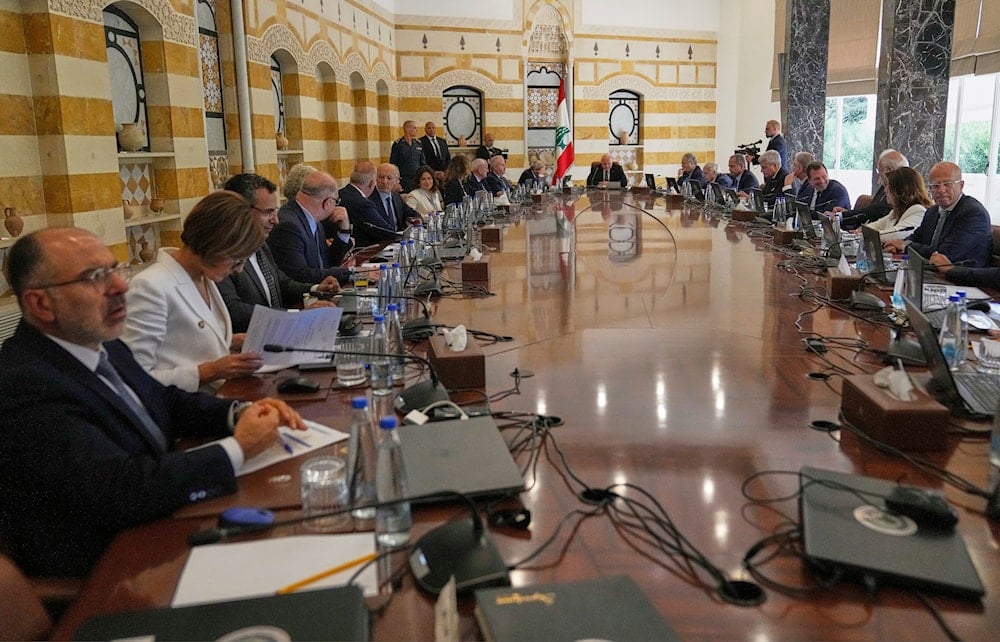Five Lebanese ministers quit government session on arms monopoly
The ministers who withdrew from the session are four Hezbollah and Amal ministers, in addition to independent Minister Fadi Makki.
-

Lebanese President Joseph Aoun, centre background, leads a cabinet meeting to discuss the army plan for disarming Hezbollah, at the Presidential Palace in Baabda, east of Beirut, Friday, Sept. 5, 2025 (AP)
The four ministers from Amal and Hezbollah, along with a fifth independent minister, Fadi Makki, withdrew from the Lebanese government's session and later left the Baabda Presidential Palace, to protest the item of the session meant to discuss the army's plan for the state's exclusive authority over arms.
The ministers initially withdrew to an adjacent room after leaving the session, before departing the presidential palace entirely.
On Friday afternoon, the Lebanese Council of Ministers convened a session to discuss the plan the army had prepared for the state to exercise exclusive authority over weapons, with additional items on its agenda related to environmental, financial, and energy matters.
Al Mayadeen's correspondent reported earlier that the ministers from Amal and Hezbollah would refuse to discuss the army's plan, which they described as "an executive tool for an unconstitutional government decision."
Our correspondent also reported that Army Commander General Rodolphe Haykal attended the session's opening to present the army's plan, prompting the ministers to leave in protest.
Following the government session on August 5, Lebanese Prime Minister Nawaf Salam had announced that the army was tasked with developing an implementation plan for the state's exclusive authority over weapons by the end of last month. That session also saw Hezbollah and Amal ministers withdrawing from the meeting.
Handing over arms is handing over honor: MP Mohammad Raad
Speaking to Al Manar TV on August 8, Mohammad Raad, the head of Hezbollah’s parliamentary bloc Loyalty to the Resistance, stated that the US and Israeli push for a timetable to implement their demands from the Lebanese government comes because time is not in their favor.
“The presence of the Resistance is what truly disturbs them,” Raad stated, cautioning that “the decision to disarm [the Resistance] reveals to the enemy an arena for tampering with internal stability, and the goal may be to make it an internal problem instead of a Lebanese-Israeli one.”
Raad revealed that diplomats acting under US pressure contacted certain figures to urge them to call and congratulate the president, asserting that while the state can maintain its own authority, it cannot confront "Israel" alone. He credited the Resistance's weapons with protecting Lebanon since 1982, achieving liberation and victory, establishing a balance of deterrence, and thwarting the enemy's expansionist ambitions.
“To say ‘hand over your arms’ is to say ‘hand over your honor.’ Handing over our arms is suicide, and we do not intend to commit suicide,” Raad told Al Manar, stating, “Ask the army if they would hand over their arms, which is their honor. Would they invite the world to betray us by giving up their arms? If we hand over our arms, who will safeguard our sovereignty and protect our country?”

 3 Min Read
3 Min Read








